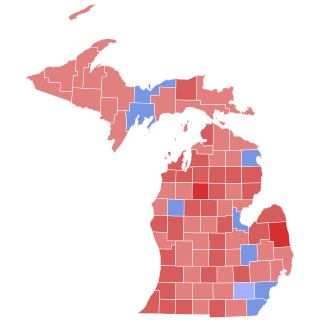
The 1964 United States Senate elections were held on November 3. The 33 seats of Class 1 were contested in regular elections. Special elections were also held to fill vacancies. They coincided with the election of President Lyndon B. Johnson by an overwhelming majority, to a full term. His Democratic Party picked up a net two seats from the Republicans. As of 2023, this was the last time either party has had a two-thirds majority in the Senate, which allowed the Senate Democrats to override a veto, propose constitutional amendments, or convict and expel certain officials without any votes from Senate Republicans. However, internal divisions would have prevented the Democrats from having done so. The Senate election cycle coincided with Democratic gains in the House in the same year.

The 1958 United States Senate elections were elections for the United States Senate which occurred in the middle of President Dwight D. Eisenhower's second term. Thirty-two seats of Class 1 were contested in regular elections, the new state of Alaska held its first Senate elections for its Class 2 and 3 seats, and two special elections were held to fill vacancies.

The 1954 United States Senate elections was a midterm election in the first term of Dwight D. Eisenhower's presidency. The 32 Senate seats of Class 2 were contested in regular elections, and six special elections were held to fill vacancies. Eisenhower's Republican party lost a net of two seats to the Democratic opposition. This small change was just enough to give Democrats control of the chamber with the help of the Independent who at the start of this Congress in January 1955 agreed to caucus with them; he later officially joined the party in April 1955.

The United States Senate election of 1948 in Massachusetts was held on November 2, 1948, with Republican incumbent Leverett Saltonstall defeating his challengers.

The 1994 United States Senate election in Michigan was held November 8, 1994. Incumbent Democratic Senator Don Riegle decided not run for re-election. Spencer Abraham won the open seat, becoming the first and so far only Republican to win a U.S. Senate race in Michigan since Robert P. Griffin in 1972 and the first to win the state's Class I seat since Charles E. Potter in 1952. As of 2024, this is the last time that a man won the Class 1 Senate seat in Michigan, and the last time in general that a Republican was elected to a U.S. Senate seat in Michigan.

The 1976 United States Senate election in Pennsylvania was held on November 2, 1976. Incumbent Republican U.S. Senator and Minority Leader Hugh Scott decided to retire. Republican John Heinz won the open seat.

The 1932 United States Senate election in Indiana took place on November 8, 1932. Incumbent Republican Senator and Senate Majority Leader James E. Watson ran for a third term in office, but was defeated by Frederick Van Nuys in a landslide.

The 1968 United States Senate election in New York was held on November 5, 1968. Incumbent Republican U.S. Senator Jacob Javits defeated Democratic challenger Paul O'Dwyer and Conservative Party challenger James Buckley in a three-way race.

The 1926 United States Senate election in Illinois took place on November 2, 1926.

The 1942 United States Senate election in Michigan was held on November 2, 1942. Incumbent Democratic U.S. Senator Prentiss M. Brown ran for re-election to second term in office, but was defeated by Republican Homer S. Ferguson.

The 1928 United States Senate special election in Ohio was held on November 6, 1928, to elect a successor to Frank B. Willis, who died in office in March 1928. Republican U.S. Representative Theodore E. Burton, who previously held this seat from 1909 to 1915, won the open race to succeed him.

The 1926 United States Senate special election in Ohio was held on November 2, 1926. Incumbent Republican Senator Frank B. Willis was re-elected to a second term in office, defeating former U.S. Senator Atlee Pomerene.

The 1948 United States Senate election in New Hampshire took place on November 2, 1948. Incumbent Republican Senator Styles Bridges won re-election to a third term in office, defeating Democrat Alfred Fortin.

The United States Senate election of 1948 in New Jersey was held on November 2, 1948.

The 1954 United States Senate special election in California was held on November 2, 1954, to elect a U.S. Senator to complete the unexpired term of Senator Richard Nixon, who resigned on becoming Vice President of the United States following the 1952 presidential election. Incumbent Republican U.S. Senator Thomas Kuchel, who had been appointed by Governor Earl Warren, won election to the remainder of the term, defeating Democratic nominee Sam Yorty.

The 1916 United States Senate election in Maine was held on September 11, 1916.

The United States Senate election of 1916 in New Jersey was held on November 7, 1916.

The 1954 United States Senate election in Michigan was held on November 2, 1954. Incumbent Republican U.S. Senator Homer S. Ferguson ran for re-election to a third term, but was defeated by the Democratic Detroit Board of Education member Patrick V. McNamara.

The 1972 United States Senate election in Michigan was held on November 7, 1972. Incumbent Republican U.S. Senator and Senate Minority Whip Robert P. Griffin ran for re-election to a second term, won reelection defeating the Democratic candidate, and Michigan Attorney General Frank J. Kelley by 6%. Despite President Richard Nixon’s landslide victory in Michigan and the rest of the country, Griffin’s margin of victory decreased from the previous election.

The United States Senate election of 1952 in New Jersey was held on November 4, 1952.






















